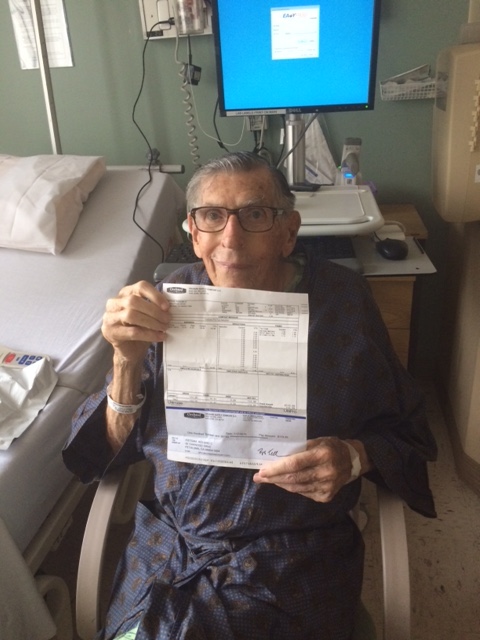Here's why: my father lost his wife (my mom) of 62 years about a year ago. He told me last week, when he thought I was asking "Where's the pasta?" (he can't hear—I had asked "Which doctor?"), that he hasn't cooked anything on the stove since she died. He reports that evenings are the hardest.
"It's when I feel most lonesome," he said.
Which makes sense. And has the effect on the daughter of a melon baller coring her at the midline.
This hole-in-his-life would explain why my 86-year-old father decided—despite being retired for 18 years—that he needed to get a job. He would request the evening shift, say 4-9p.
This is a depression-era man born in 1929, one of six siblings, who knows from hard work and determination, who made his CB handle circa 1975 the "Straight Arrow, and who is, on average, 2.5 hours early for all flights. This is a man who got a job at a hardware store last month because of an assistant manager named Bob, who read between the lines.
He trained for a week, mostly on the computer with other trainees, before heading into the ER with a-fib and congestive heart failure. Same thing from which his deceased wife died.
When my dad called Bob, he was told not to worry. "Just call me when you're out. The job will be here."
After he went into the ICU the second time and tried to bow out of the position, Bob said, "I'm sorry, you can't quit. I want you to take a leave of absence and call me when you're ready to come back."
Bob doesn't know that my dad's ejection fraction, which is a measure of how efficiently his left ventricle is pumping, is 15%.
But he does know something that my dad's cardiologists don't ...
purpose
connection
contribution
belonging
significance.
For that, I will be forever grateful.
And reminded that there are, in fact, angels on earth.
* The photo is of my father, holding his first paycheck from OSH. I delivered it to him in the hospital on his 4th day ... he's now on his 11th ... the food is not improving, but his heart is holding on.

 RSS Feed
RSS Feed